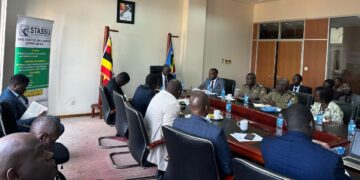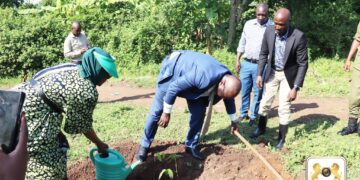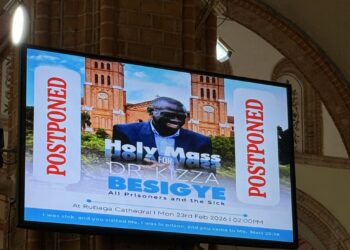By Leonard Kamugisha Akida,
NATIONAL
Ministries, Departments and Agencies (MDAs) and Local Governments have been asked to frugally spend funds on areas set out in their program implementation action plans.

“We also call on the MDAs and Gus to be prudent on how they allocate resources with a view and goal to focus on the goals and results set out in their program implementation action plans,’ Budget and Tax experts said.
The call was made by David Walakira, the Executive Director of Centre for Budget and Tax Policy (CBTP) during a media engagement on the risks and enablers for the realizing FY2024/25 Budget aspirations at Lotis Towers Kampala on Wednesday April 3.
During the engagement, Walakira raised concerns about the extravagance in government which he said hinders social service delivery.

He proposed for the integration of some of the least funded programmes in the next financial year budget such as mineral development, mindset change, community mobilization, sustainable urban development and housing which are projected to receive UGx31.55bn, UGx40.92bn and UGx40.21bn, respectively.
According to him, this is a token of allocation which MDAs use to allocate money where it is not supposed to be allocated and they end up misusing taxpayer’s money.
CBTP further advised the government through her ministry of finance to closely monitor expenses for administration budgets both in the central and local governments. This they say will enable to reduce unnecessary and wasteful expenditure henceforth saving the country from accumulating heavy debt burden.
Government has allocated UGx601.512bn in the FY2024/25 budget basically for items like donations, special meals and drinks and medical expenses for its employees. But, budget experts at CBTP argue that these items although they continue to exist in every budget, they are often conduits for misuse.
They proposed that the UGx142.363bn allocated to medical expenses should be used as a seed for the National Insurance Scheme to ease access to better healthcare for all Ugandans than a chosen few government employees while UGx162.682bn and UGx296.466bn allocated to donations and special meals and drinks, respectively be spent to other requisite programmes.

“When the health system is strengthened and protected against shocks through a functional insurance system, there would be no need for a handful of public officials to have special treatment that is not available to all taxpayers but funded by all taxpayers. In essence, this makes the social contract for the tax system harder to realize,” said CBTP ED, David Walakira.
On the other hand, Sophie Bampeyo Nkumba, finance for development coordinator at Oxfam Uganda urged the government to consider allocating funds to ensure climate change which she says is becoming a challenge to Uganda. She emphasized on the need for government to empower local governments to collect taxes and allocate resources to development programmed within their jurisdiction noting that this will enable government to realize it’s fiscal decentralization policy. Nampewo says this is because social service delivery largely takes place at local government levels.
Nevertheless, CBTP commended government’s consistency in reduction of fiscal deficit in the last three years stating that if the trend is well managed, it will reduce on Uganda’s debt burden.
“On the fiscal consolidation front, we are on the right track, as observed partly from the sustained reduction of fiscal deficit for three consecutive years from FY2020/21 to 2022/23,” said Walakira.

The FY2024/25 Budget framework paper indicates that discretionary financial resources are expected to reduce by UGx3.47 trillion. This according to Walakira is a position signalizing that the government is reducing its expenditure appetite likely to subdue domestic debt related costs.
The Executive Director of @cbtpafrica David Walakira has asked the tax regulatory body, @URAuganda to cast their nets wide and start taxing individuals, businesses in the informal sector in order to grow the country's tax base.@OxfaminUganda @CSBAGUGANDA @SEATINIUGANDA @mofpedU pic.twitter.com/hZDj7PXWVA
— Parrots UG (@parrotsug) April 3, 2024
He also appealed to the tax regulatory body, Uganda Revenue Authority (URA) to widen their lenses and impose taxes on non-taxable individuals and the informal sector such as the Boda Boda industry, vendors among others in order to grow the country’s tax base than relying on foreign aid and loans.








































